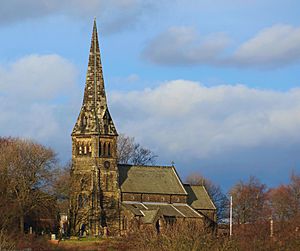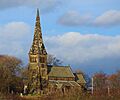St Bartholomew's Church, Clay Cross facts for kids
Quick facts for kids St Bartholomew's Church, Clay Cross |
|
|---|---|

St Bartholomew's Church, Clay Cross
|
|
| 53°9′41.34″N 1°24′55.17″W / 53.1614833°N 1.4153250°W | |
| Location | Clay Cross |
| Country | England |
| Denomination | Church of England |
| Website | claycross.org |
| History | |
| Dedication | St Bartholomew |
| Consecrated | 25 January 1851 |
| Architecture | |
| Heritage designation | Grade II listed |
| Architect(s) | Henry Isaac Stevens |
| Groundbreaking | 22 August 1849 |
| Construction cost | £2,400 (equivalent to £200,000 in 2021) |
| Specifications | |
| Capacity | 450 people |
| Length | 78 feet (24 m) |
| Width | 43 feet (13 m) |
| Height | 125 feet (38 m) |
| Administration | |
| Parish | Clay Cross |
| Deanery | Chesterfield |
| Archdeaconry | Chesterfield |
| Diocese | Diocese of Derby |
| Province | Province of Canterbury |
St Bartholomew's Church in Clay Cross is a historic building. It is a parish church that belongs to the Church of England. This church is located in Clay Cross, a town in Derbyshire, England. It is also a Grade II listed building, which means it is important and protected.
Contents
History of St Bartholomew's Church
Building the Church
The first stone for St Bartholomew's Church was placed on August 14, 1849. This stone had a special message written on it in Latin. It said that Gladwin Turbutt, a local landowner, happily laid the foundation. The church was dedicated to St Bartholomew.
The church was designed by an architect named Henry Isaac Stevens. Two companies, Samuel Watts of Derby and Mr. Kirkland of Clay Cross, built the church. The church was officially opened and blessed by the Bishop of Lichfield on January 25, 1851.
Spire and Vestry Additions
The tall spire of the church was finished in 1856 by Mr. Watt of Ashover. A weather vane was put on top of the spire in May 1856. This was done by W.J. Mackarsie to celebrate the end of the Crimean War.
In 1859, a small room called a vestry was added to the church. This work was done by George Edmund Street. The part of the church called the chancel had been closed during this building work. It was reopened by the bishop on March 20, 1859.
Special Window
Inside the south aisle of the church, there is a special stained-glass window. It was made by a company called Morris & Co.. This window remembers William Howe. He was famous for inventing a special part for railway locomotives called link motion.
Church Organ
The church used to have a pipe organ made by Charles Lloyd & Co in 1894. It was later changed by T.C. Willcock and Co in 1953. You can find details about this old organ on the National Pipe Organ Register. Today, the church uses a modern electronic organ instead of the pipe organ.
The Church Bells
St Bartholomew's Church has a set of six bells. These bells were made in 1937 by a company called John Taylor & Co. They are used to ring out melodies for services and special events.
Parish Status and Other Churches
St Bartholomew's Church is part of a group of churches in the area. This group is called a joint parish. The other churches in this group are:
- St Lawrence's Church, North Wingfield
- St Barnabas' Church, Danesmoor
- St Mark's Church, Woolley Moor
- St Mary the Virgin's Church, Pilsley
- St John's Church, Tupton
Images for kids
See also
- Listed buildings in Clay Cross


